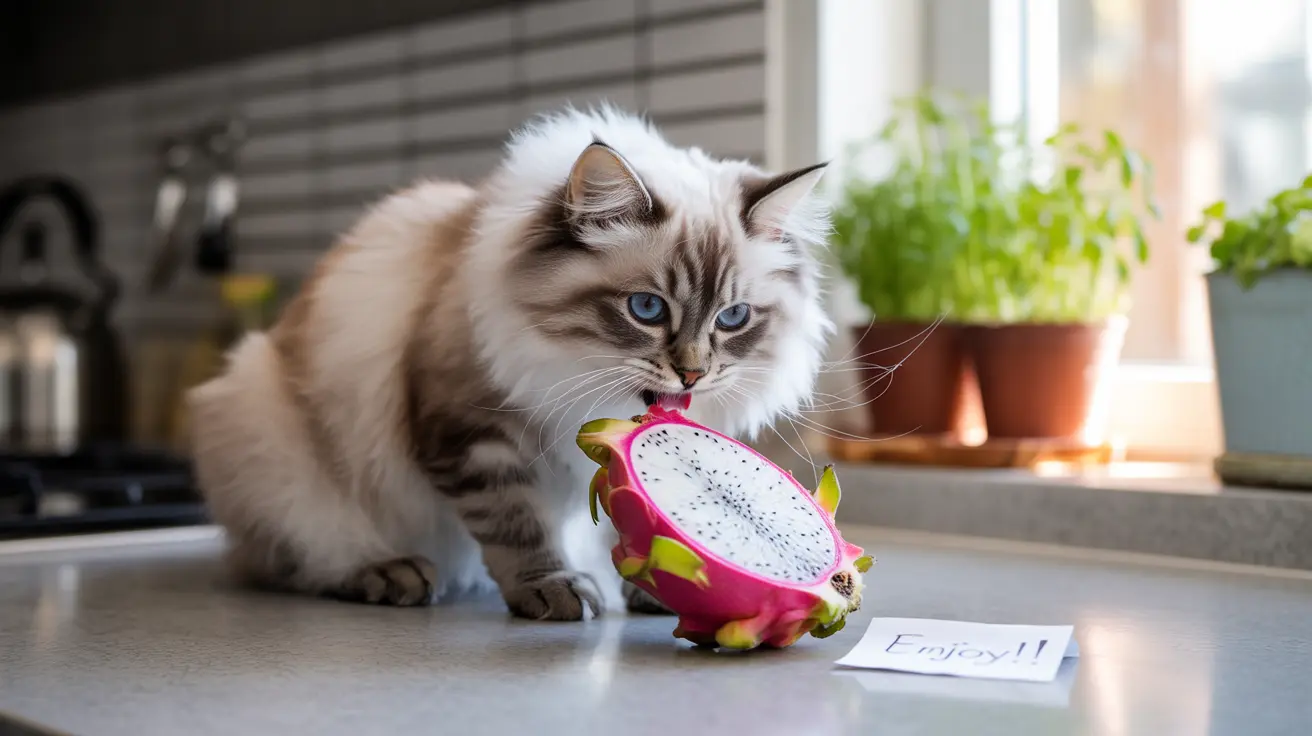If you're wondering whether cats can eat dragon fruit, the answer is yes - but with important caveats. While this exotic fruit is non-toxic to cats, it should only be offered as an occasional treat in very small amounts. Let's explore everything you need to know about feeding dragon fruit to your feline friend.
Understanding Dragon Fruit and Cats
Dragon fruit, also known as pitaya, is a tropical fruit known for its vibrant pink exterior and speckled flesh. While safe for cats to consume, it's important to understand that cats are obligate carnivores, meaning their bodies are designed to derive nutrition primarily from meat sources. Their digestive systems aren't optimized for processing fruits, including dragon fruit.
Safe Feeding Guidelines
When offering dragon fruit to your cat, follow these essential guidelines:
- Keep portions extremely small (1 teaspoon to 1 tablespoon maximum)
- Remove all skin and rind completely
- Consider removing seeds to prevent choking risks
- Only offer the flesh of the fruit
- Monitor your cat for any adverse reactions
Preparation and Serving
Always prepare dragon fruit properly before offering it to your cat:
- Wash the fruit thoroughly
- Peel completely, removing all pink skin
- Cut into tiny, manageable pieces
- Remove seeds if feeding to kittens or seniors
- Serve fresh, never fermented or spoiled
Potential Benefits and Risks
Benefits
While not nutritionally necessary for cats, dragon fruit contains:
- Vitamins A and C
- Antioxidants
- Dietary fiber
- Minerals like calcium and potassium
- Low calorie content
Risks
Be aware of these potential issues:
- Digestive upset if overfed
- Possible choking hazards from seeds
- Risk of diarrhea or vomiting
- Unnecessary sugar intake
- Potential allergic reactions
When to Avoid Dragon Fruit
Some cats should not be given dragon fruit, including:
- Cats with diabetes or obesity
- Those with sensitive digestive systems
- Kittens under 12 weeks
- Cats with known fruit allergies
- Pets with underlying health conditions
Frequently Asked Questions
Is dragon fruit safe for cats to eat, and how much can I give them?
Yes, dragon fruit is safe for cats in small amounts. Limit portions to 1 teaspoon to 1 tablespoon as an occasional treat, never as a regular part of their diet.
What are the potential digestive risks if my cat eats too much dragon fruit?
Overconsumption can lead to diarrhea, vomiting, stomach discomfort, and loose stools due to the fruit's high fiber and sugar content.
Can dragon fruit provide any nutritional benefits for my cat's health?
While dragon fruit contains vitamins and antioxidants, cats cannot efficiently process nutrients from plant sources. Any benefits are minimal compared to their regular meat-based diet.
Should I remove the seeds and peel before feeding dragon fruit to my cat?
Yes, always remove the peel completely and consider removing seeds, especially for kittens or seniors, to prevent choking hazards and digestive issues.
How often can I offer dragon fruit as a treat without harming my cat?
Dragon fruit should be given as an occasional treat only, no more than once or twice a month, and in very small portions.
Conclusion
While cats can safely eat dragon fruit in moderation, it's best to focus on providing them with a balanced, meat-based diet that meets their nutritional needs. If you choose to offer dragon fruit as a treat, do so sparingly and with proper preparation. Always consult with your veterinarian before introducing any new foods to your cat's diet.






